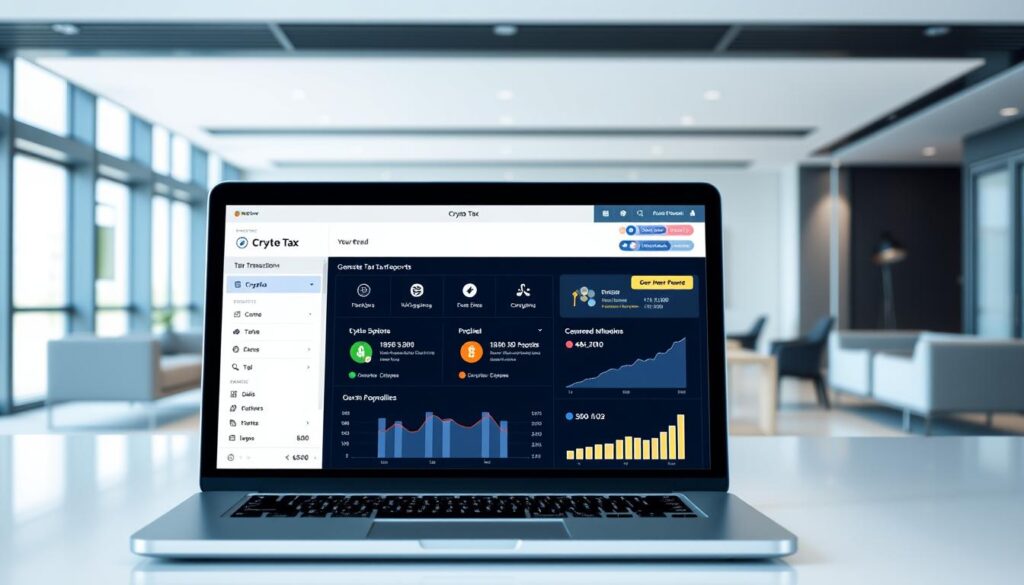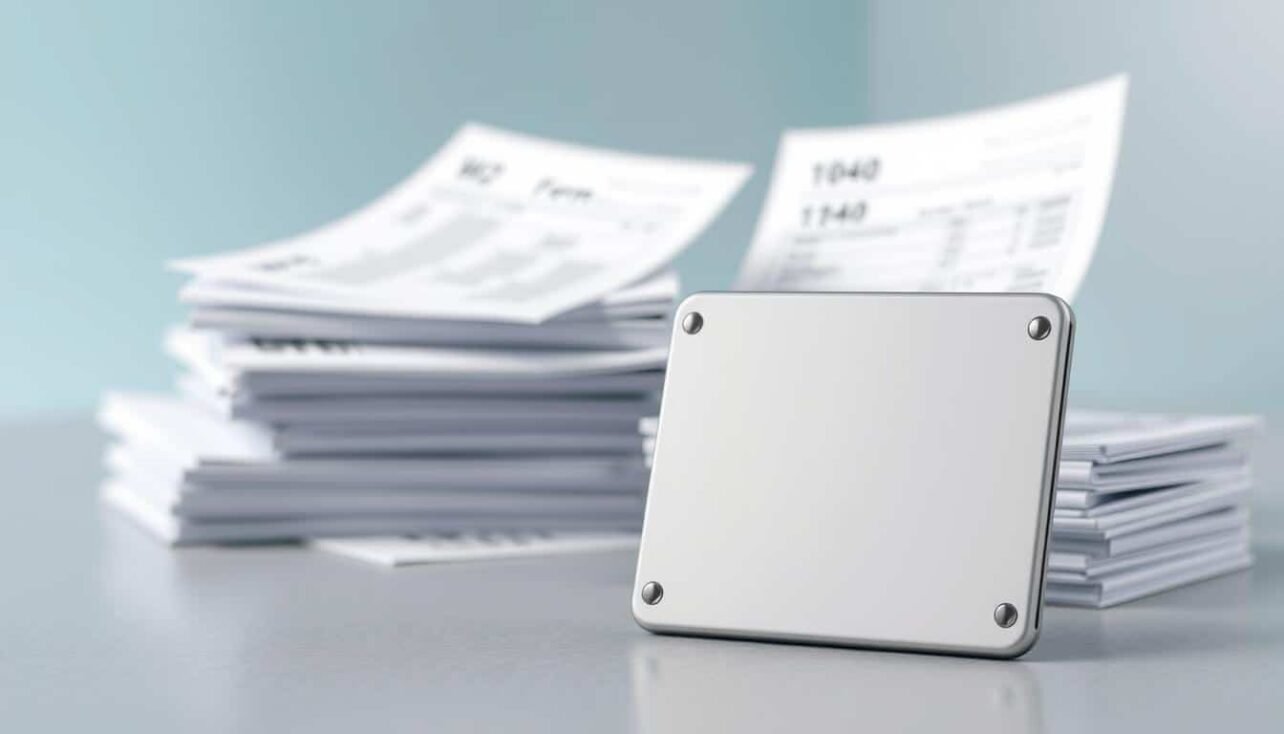As more people use cryptocurrencies, keeping them safe in hardware wallets is key. But, the tax rules for these wallets are tricky. This guide helps U.S. investors understand the tax side of crypto hardware wallets and how to follow IRS rules.
Using hardware wallets keeps your crypto safe from hackers. But, it doesn’t mean you don’t have to report your taxes. Knowing when you have to report and what documents you need is crucial to avoid fines.
Key Takeaways
- Hardware wallet use does not eliminate tax reporting requirements under IRS guidelines.
- Transferring crypto to hardware wallets may trigger taxable events like sales or exchanges.
- Maintaining transaction records for cold storage is required for accurate cost basis calculations.
- Staking rewards and mined crypto held in hardware wallets face distinct tax treatments.
- IRS audits focus on reporting gaps in hardware wallet transactions and foreign holdings.
Understanding Crypto Hardware Wallets and Tax Liability
Crypto hardware wallets keep your digital assets safe offline. But, they bring special tax challenges. Unlike exchanges, they don’t track transactions automatically. You need to watch them closely to follow tax rules for digital assets.
The IRS sees virtual currency as property, thanks to Notice 2014-21. So, every time you move or sell it, you must report capital gains.
How Hardware Wallets Differ from Exchanges for Tax Purposes
When you move crypto between exchanges, they keep records for you. But, with hardware wallets, every move is taxable. This means:
- Exchanges have automatic trade confirmations
- Cold storage needs manual records for each transaction
- IRS rules apply the same to both
IRS Classification of Crypto Assets
The IRS calls virtual currency intangible property, not money. Selling or trading it for USD means you have to pay taxes on capital gains. Even getting rewards or airdrops counts as property transactions. Not keeping track of cost basis can lead to trouble.
Tax Visibility Challenges with Cold Storage
Cold storage devices don’t report transactions automatically. You must write down every transaction’s details by hand. Without a central place to keep records, tracking them for audits is hard. This makes following tax treatment of virtual currency rules tricky.
Tax Considerations for Crypto Hardware Wallets: Essential Principles
Hardware wallets keep your crypto safe but don’t make taxes go away. The IRS sees crypto stored offline as the same as on exchanges. You must keep track of buys, sells, and moves, following IRS guidelines for cryptocurrency. Not following these rules can lead to penalties, even with cold storage.
- Cost basis tracking: Record the purchase price and fees for each asset. This data determines capital gains or losses when selling.
- Holding periods matter: Assets held over a year qualify for lower long-term capital gains rates. The IRS requires proof of dates for proper classification.
- Every transfer counts: Moving crypto between wallets may trigger taxable events, like exchanges or staking. Documentation is mandatory even for non-commercial activity.
Self-custody means you’re fully responsible. Unlike exchanges, hardware wallets don’t send out tax forms like Form 1099. You must log every transaction yourself. The IRS requires reporting all crypto activity, including offline storage, on Schedule D and Form 8949. Not reporting can lead to audits.
Understanding the basics is key to compliance. Stay updated with IRS publications and use software for transaction logging. Balancing security with tax duties ensures you’re legally and financially transparent.
When Transferring Crypto to Your Hardware Wallet Triggers Taxation
Transferring crypto between your wallets doesn’t always mean you’ll face tax issues. The IRS sees non-taxable events like moving Bitcoin from an exchange to a hardware wallet as private transfers. This means no tax event happens when you keep assets in your control without selling or exchanging them. But, some actions during transfers can lead to cryptocurrency tax implications and crypto tax reporting needs.
Non-Taxable Events
- Moving crypto between wallets you fully control
- Physical storage changes (e.g., Ledger to Trezor devices)
- Private key transfers without profit or loss
Surprising Taxable Actions
Tax forms might ask you to report if transfers include:
- Currency conversion (e.g., BTC to ETH during transfer)
- Airdrops or hard forks received during storage
- Receiving payment directly into your hardware wallet
Documentation Must-Haves
Keep records of:
- Transfer dates and USD values at time of movement
- Transaction IDs and wallet addresses
- Proof of ownership for dispute resolution
IRS audits look closely at transfer trails—missing records can lead to penalties. Use tracking tools to log all activity, ensuring you meet crypto tax reporting standards. Always note if transfers involve taxable exchanges hidden in routine movements.
Calculating Cost Basis for Assets Stored in Cold Wallets
Tracking the cost basis of your crypto is key to following crypto assets taxation rules. When you move your crypto to cold storage, the original purchase details matter for taxes. The IRS wants you to pick one way to report capital gains tax on crypto.

- FIFO (First-In, First-Out): This method says the oldest coins are sold first. It uses the oldest purchase prices for cost basis.
- LIFO (Last-In, First-Out): It uses the newest purchase costs. But, it’s only allowed if you document it right.
- Specific Identification: This method lets you pick which coins you sold. You need to keep detailed records of when and how much you bought them.
People with cold wallets need to keep track of where their crypto came from. This includes coins bought, mined, given as gifts, or received in airdrops. Each way has its own rules for cost basis. For example, mined crypto’s cost basis includes the cost of mining hardware and electricity.
- Purchases: Keep records of when you bought coins and any fees
- Airdrops: Use the fair market value at the time you got them
- Gifts: Use the donor’s original cost basis or the fair market value at the time of the gift
Not counting all costs can mean you pay too little capital gains tax on crypto. Use special crypto tax software to help with cost basis calculations. Keeping detailed records of your transactions is important for audits.
Reporting Requirements for Hardware Wallet Holdings
Following crypto tax reporting rules for hardware wallets is crucial. You need to understand tax laws for digital wallets well. Federal forms like Form 8949 help track capital gains. Schedule 1 is for income from mining or staking.
Ignoring these steps can lead to big penalties. You could face up to 25% of unreported values.
- FBAR requires reporting digital wallet balances over $10,000 abroad, even in cold storage.
- FinCEN’s proposed rules may soon mandate tracking transfers over $3,000 through hardware wallets.
- States like California and New York have their own crypto tax laws for digital wallets. These differ from federal standards.
Not disclosing holdings in hardware wallets can lead to penalties. The 2023 Infrastructure Bill made reporting rules stricter for brokers. This affects self-custody users too.
It’s important to track all transactions. This includes transfers between wallets. This way, you’ll meet the changing tax laws for digital wallets.
Record-Keeping Best Practices for Hardware Wallet Transactions
Keeping accurate records is key for following IRS rules on tax treatment of virtual currency. Every move with your hardware wallet, like transfers or trades, needs to be documented. This is to ensure crypto tax reporting is correct. Not keeping records can lead to penalties during audits.
- Create a ledger to track dates, wallet addresses, amounts, and USD values at the time of each transaction.
- Save screenshots of blockchain confirmations and email receipts for withdrawals or deposits.
- Use cloud storage and physical backups to keep records safe from hardware failures.
Make sure timestamps match up with withdrawal and deposit logs. Tools like CoinTracker or CryptoTaxCalculator help with this. Keep records for at least 6 years if you’re involved in any disputes, as per IRS rules.
Without organized records, it’s hard to prove cost basis or avoid wash sales. This can lead to misclassifying gains or losses. Regularly check your backups to keep your data safe and ready for auditors.
Tax Treatment of Staking Rewards from Hardware Wallets
Staking rewards from hardware wallets have special tax rules for digital assets. The IRS sees staking income as taxable when you get it. It’s valued at the asset’s fair market value. This is different from mining, which has its own rules under crypto assets taxation.
In Jarrett v. United States, courts said mining income is taxable when you get it. This ruling also affects staking. Now, taxpayers must figure out if staking rewards are ordinary income or capital gains. The IRS currently says they should be taxed right away.
- Reporting Requirements: You need to report staking gains on Form 1040 Schedule 1. Keep track of basis values for future capital gains or losses.
- Business Deductions: You might deduct expenses like hardware depreciation, energy costs, and software fees. This is if staking is seen as a business.
- Documentation: Keep records of staking dates, reward amounts, and expenses. Since hardware wallet users often don’t get 1099 forms, you’ll need to report yourself.
Being consistent in how you report helps avoid audits. Check IRS Notice 2014-21 for crypto taxation rules. Also, watch for updates as courts make more decisions on staking’s tax status.
Managing Capital Gains and Losses with Hardware Wallets
Managing capital gains tax on crypto well means smart handling of assets in hardware wallets. It’s key to keep track of when you bought things and their original cost. This helps you get the lower long-term tax rates if you hold them for over a year. But, if you sell them quickly, you’ll face higher taxes and need to keep good records to avoid paying too much.
- Use tax-loss harvesting to offset gains by selling depreciated assets stored in hardware devices.
- Document all transfers between wallets to prevent misreporting during audits.
- Monitor proposed tax rules, as future changes may extend wash sale restrictions to crypto.

Users of hardware wallets have special tax considerations for crypto hardware wallets. Unlike exchanges, cold storage doesn’t keep records automatically. So, you must track everything yourself. Make sure to log every transaction’s details to figure out your cost basis accurately.
When you adjust your portfolio, keep a record of each move. This is important to follow IRS rules. For instance, selling one coin to buy another can lead to taxable events that need to be documented.
IRS is watching crypto transactions more closely than ever. For more on how to report, check out IRS reporting requirements for crypto gains. Regularly check your records to stay compliant and avoid fines. Keeping your records clear makes tax time easier.
Tax Implications of Hardware Wallet Security Measures
Setting up advanced security for hardware wallets needs careful tax attention. IRS guidelines for cryptocurrency make it clear who owns assets, even with complex security. Here are important points where security meets tax rules for digital wallets.
Multi-Signature Wallets and Beneficial Ownership
Multi-signature wallets share control among users. But the IRS sees this as shared ownership. Tax forms must show each person’s share in transactions.
For example, a joint crypto transfer needs separate tracking for each person. It’s important to have proof of ownership percentages to avoid tax mistakes under IRS guidelines for cryptocurrency.
Inheritance Planning for Digital Assets
Planning estates with hardware wallets must consider IRS rules. When heirs get crypto, its value at death resets its cost basis, as IRS Publication 551 states. Giving access before death might trigger gift tax if the value is too high.
Experts suggest using legal contracts to document these transfers. This proves who owns the assets.
Lost or Stolen Wallets: Loss Deduction Rules
- Stolen crypto: Theft losses might be deductible if you have the right documents. You’ll need proof of ownership and loss, like police reports or transaction logs.
- Lost wallets: Loss deductions are hard to get after 2017 tax changes, except in disaster areas. IRS rules say you can’t deduct losses on personal use assets.
- Valuation: To deduct losses, you must know the asset’s fair market value at the time of loss. Keep records of the asset’s original cost and how it was lost.
Keeping good records helps follow tax laws for digital wallets and lowers audit risks.
IRS Audit Flags for Crypto Hardware Wallet Users
IRS rules for cryptocurrency are strict. They focus on how you treat virtual currency for taxes. If your records don’t match your transactions, you might face an audit. Here are some reasons why:
- Large unexplained transfers to hardware wallets without Form 8300 filings
- Inconsistent crypto valuations compared to market data at transaction times
- New funds appearing in wallets without documented origins
The IRS uses special tools to check your crypto activities. They can even ask for data from exchanges. If you say you don’t have crypto but you do, you could get in trouble.
It’s important to keep good records. Note every transaction’s date, value, and reason. Keep receipts for all your crypto dealings. Use IRS-approved software to figure out your gains and losses.
Even though hardware wallets can keep your crypto private, you still have to follow tax laws. Not following these rules can lead to serious legal issues.
International Tax Considerations for Hardware Wallet Holders
Crypto transactions across borders in hardware wallets bring special cryptocurrency tax implications for investors worldwide. US taxpayers with crypto abroad must follow FATCA rules. Non-residents might face scrutiny over US gains. Knowing these tax rules for digital assets can prevent fines.
FATCA Compliance for US Citizens with Foreign Crypto Storage
US citizens with crypto in foreign wallets over $10,000 must file FBAR forms. Even rewards from abroad might need Form 8938 disclosure. Not reporting can lead to fines over $10,000.
Tax Treaties and Foreign Tax Credits
Double taxation is a risk with crypto in many countries. Tax treaties can lower taxes on profits. Claiming foreign tax credits can reduce US taxes on crypto income abroad. Discover how treaties impact cross-border crypto.
Non-Resident Tax Obligations
Non-US residents might face 30% withholding on crypto sales to US parties. Gains from US exchanges or mining are US-source income. This triggers 1099 reporting.
Software Tools for Hardware Wallet Tax Compliance
For those using hardware wallets, tracking transactions for crypto tax reporting is key. Tools like CoinTracker and Koinly make it easier to keep an eye on assets stored offline. They support CSV imports or tracking blockchain addresses to catch movements from hardware wallets. Yet, their accuracy relies on manual entry for transactions not from exchanges.

- CoinTracker: Syncs with 200+ blockchains via API or CSV uploads
- TokenTax: Highlights staking rewards and airdrops detection
- TaxBit: Provides IRS-compliant export formats for hardware wallet transactions
It’s crucial to double-check all entries since these tools might miss private wallet transfers. Tax rules for crypto hardware wallets require careful attention. Software can automate most tasks, but a thorough review is essential. Choose platforms that support your hardware (Ledger/Trezor) and blockchain networks (Bitcoin, Ethereum, etc.).
Effective workflows include:
- Export wallet transaction logs monthly
- Import into tax software with date/time stamps
- Compare against IRS Form 8949 templates
Keep in mind, software has its limits, like slow blockchain scans and missing memo fields. Always check reports against the original transaction receipts. Proper crypto tax reporting helps stay compliant and reduces audit risks. Remember, while tools help, they don’t replace the need for manual checks.
Mining Proceeds Stored in Hardware Wallets: Special Tax Considerations
Crypto assets taxation applies to mining rewards stored in hardware wallets, even when kept offline. Miners must report income at the fair market value of coins mined, per tax laws for digital wallets. For example, rewards transferred to cold storage immediately after mining count as taxable income under IRS guidelines. Learn more about reporting requirements in this guide on crypto-mining taxes.
Miners operating as businesses face self-employment tax rules. Here’s how to navigate key areas:
- Self-Employment Taxes: Mining income qualifies for 15.3% self-employment tax if treated as a business. Quarterly estimated payments may apply.
- Equipment Deductions: Mining gear qualifies for Section 179 deductions or 5-year MACRS depreciation. Track expenses like power costs to offset income.
- Business Classification: Prove mining is a business (not a hobby) via profit history, time invested, and business structure. Separate wallet addresses for mining vs. personal funds strengthens this argument.
Documentation is critical. Keep records of mined block timestamps, equipment purchases, and wallet transactions. Failing to classify mining as a business could limit deduction eligibility under IRS rules. Consult tax professionals to align cold storage practices with crypto assets taxation obligations.
Common Tax Mistakes When Using Hardware Wallets
Users of hardware wallets often miss important details about cryptocurrency tax implications. One big mistake is not logging asset transfers from exchanges to cold storage. Even though these moves aren’t taxable, not keeping records makes it hard to prove cost basis later.
Another mistake is thinking wallet-to-wallet transfers are hidden from tax authorities. The tax treatment of virtual currency requires reporting all transactions, even within personal devices.
Many ignore airdrops or hard forks received in cold storage, which the IRS sees as taxable income. Others mix crypto from different sources without tracking purchase dates. This makes calculating capital gains tricky.
Network fees deducted during transactions also affect cost basis. If ignored, they make profits seem higher than they are.
Some use different accounting methods for sales, which can attract IRS attention. For example, switching from FIFO to specific identification mid-year without formal election breaks rules. Others ignore Form 8300 reporting for large crypto payments, risking penalties.
To fix these issues, users can amend past returns with Form 1040-X or use the IRS Voluntary Disclosure Practice. Keeping detailed records and using tracking software helps avoid future mistakes. Remember, hardware wallets don’t keep your taxes secret because of blockchain traceability and exchange KYC data sharing.
How Recent Tax Law Changes Affect Hardware Wallet Users
U.S. tax laws for digital wallets are changing fast. This means hardware wallet owners need to follow new rules. The IRS is also updating its guidelines for cryptocurrency. It’s important to stay up to date to avoid fines.
Infrastructure Bill Implications
The 2021 Infrastructure Act gave the IRS more power. It now includes some crypto platforms in its definition of “brokers.” This could make hardware wallet makers report user activities. Users might have to be more open about their transactions.
Proposed Regulations on Crypto Reporting
- Proposed IRS rules might ask for reports on crypto deals over $10,000. This could affect how users move money in hardware wallets.
- Stablecoins might get new rules under Treasury proposals.
- FinCen’s draft aims to make it clear who owns hardware wallets.
Court Cases Shaping Compliance
Jarrett v. U.S. (2023) said staking rewards are taxable income. This affects users of cold storage. Harper v. IRS questioned blockchain use in audits, showing the importance of privacy.
Keep an eye on laws like the Responsible Financial Innovation Act. It might make some reporting rules easier for hardware wallets. Also, watch for court decisions and sign up for IRS updates to stay on top of tax changes.
Securing Your Financial Future Through Proper Hardware Wallet Tax Management
Managing taxes for crypto hardware wallets is key to staying compliant and growing your investments. Keeping up with crypto tax reports and having organized records helps avoid fines. It also meets IRS rules. Using blockchain explorers and tax software makes tracking easier for accurate tax filings.
Stay updated with IRS changes and keep your records flexible. For tricky cases like staking rewards or inheritance, get professional help. This balance keeps your assets safe and your taxes in order.
Begin by sorting out your transaction logs, checking your holdings yearly, and getting expert advice. Being proactive makes your hardware wallets safe for long-term growth without tax worries. Focusing on crypto wallet tax management helps keep your wealth safe as rules change.
FAQ
What are the key tax considerations for using a cryptocurrency hardware wallet?
Using a hardware wallet means you must follow certain tax rules. You need to report any capital gains and keep track of the cost basis. Since the IRS sees crypto as property, any transaction could lead to taxes. It’s key to follow IRS rules for crypto.
How does transferring cryptocurrencies into a hardware wallet affect tax liability?
Just moving crypto into a hardware wallet usually doesn’t trigger taxes. But, swapping crypto or getting payments in the wallet can lead to taxes. Keeping detailed records of these actions is crucial for tax reporting.
What documentation do I need to keep for transactions involving my hardware wallet?
It’s important to keep detailed records. You should note the date, amount, and USD value of each transaction. Also, record the wallet addresses and the reason for the transfer. These details help with accurate tax calculations and protect you in audits.
Are there any tax implications associated with staking rewards received in a hardware wallet?
Yes, staking rewards are taxed as regular income at their market value. You must report this income on your taxes and keep records for future gains. Proper documentation is key for tax compliance.
How do tax laws for digital assets impact my hardware wallet holdings?
Tax laws say you must pay capital gains tax on crypto sales or exchanges, even in hardware wallets. You need to track each transaction closely. The taxpayer is responsible for accurate reporting.
What are the potential risks of using a hardware wallet from a tax perspective?
One big risk is not having automatic tracking and reporting like exchanges. You must actively monitor and document transactions. Inaccuracies can lead to penalties. The IRS can also track unreported gains through blockchain analysis.
What common tax mistakes do hardware wallet users make?
Users often forget to track cost basis when moving assets, ignore airdrops, or think wallet-to-wallet transfers are tax-free. There are ways to fix past mistakes, like filing amended returns.
How can I manage capital gains and losses effectively with a hardware wallet?
Use tax-loss harvesting and keep accurate cost basis records. Also, document transfers well to ensure clear tax reporting. This helps manage capital gains effectively.
What software tools can help with tax compliance for hardware wallet users?
Tools like CoinTracker, Koinly, and TaxBit can help track transactions from hardware wallets. They provide insights for tax reporting. However, users should double-check the accuracy of the data.
Are there any international tax considerations for hardware wallet holders?
Yes, there are international tax rules to consider. These include FATCA for U.S. citizens, tax treaty benefits, and non-resident tax obligations. It’s important to understand these laws if you hold assets across borders.


No comments yet